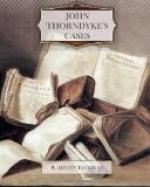“I see now,” said Brodribb; “but who set up this apparatus, and why was it done?”
“Let me ask you a question,” said Thorndyke. “Is Alfred Calverley the next-of-kin?”
“No; there is Fred’s younger brother. But I may say that Fred has made a will quite recently very much in Alfred’s favour.”
“There is the explanation, then,” said Thorndyke. “These two scoundrels have conspired to drive the poor fellow to suicide, and Raggerton was clearly the leading spirit. He was evidently concocting some story with which to work on poor Fred’s superstitions when the mention of the Chinaman on the steamer gave him his cue. He then invented the very picturesque story of the murdered mandarin and the stolen pearl. You remember that these ‘visitations’ did not begin until after that story had been told, and Fred had been absent from the house on a visit. Evidently, during his absence, Raggerton took down the original mirror, and substituted this swinging arrangement; and at the same time procured the Chinaman’s dress and mask from the theatrical property dealers. No doubt he reckoned on being able quietly to remove the swinging glass and other properties and replace the original mirror before the inquest.”
“By God!” exclaimed Mr. Brodribb, “it’s the most infamous, cowardly plot I have ever heard of. They shall go to gaol for it, the villains, as sure as I am alive.”
But in this Mr. Brodribb was mistaken; for immediately on finding themselves detected, the two conspirators had left the house, and by nightfall were safely across the Channel; and the only satisfaction that the lawyer obtained was the setting aside of the will on facts disclosed at the inquest.
As to Thorndyke, he has never to this day forgiven himself for having allowed Fred Calverley to go home to his death.
VII
THE ALUMINIUM DAGGER
The “urgent call”—the instant, peremptory summons to professional duty—is an experience that appertains to the medical rather than the legal practitioner, and I had supposed, when I abandoned the clinical side of my profession in favour of the forensic, that henceforth I should know it no more; that the interrupted meal, the broken leisure, and the jangle of the night-bell, were things of the past; but in practice it was otherwise. The medical jurist is, so to speak, on the borderland of the two professions, and exposed to the vicissitudes of each calling, and so it happened from time to time that the professional services of my colleague or myself were demanded at a moment’s notice. And thus it was in the case that I am about to relate.
The sacred rite of the “tub” had been duly performed, and the freshly-dried person of the present narrator was about to be insinuated into the first instalment of clothing, when a hurried step was heard upon the stair, and the voice of our laboratory assistant, Polton, arose at my colleague’s door.




